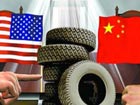| Videos | ? Latest |
|
? Feature | ? Sports | ? Your Videos |
China, US seek to avoid trade war
China-US trade tensions have been heating before the US President's first visit to China. The timing couldn't be worse as the world sees cooperation between Beijing and Washington as crucial to nurturing the recovery of the global economy. BizChina's reporter finds out how trade disputes have escalated and how they could be prevented from bringing global consequences.
The trade dispute upgraded in September when the Obama administration announced extra duties on Chinese tyres. Tensions intensified earlier this month when the US slapped anti-dumping tariffs of up to 99 percent on Chinese oil well pipes, a trade worth 3.2 billion US dollars annually.
China protested by branding the decisions an "abuse of protectionism" and retaliated by launching its own probe into US chicken and car imports.
John Watkins, chairman of the American Chamber of Commerce in China says he understands China's reaction, and explained that the US moves were due to domestic pressure.
John Watkins, Chairman of The American Chamber of Commerce said "I understand fully how it will hurt the feeling of the Chinese people. Clearly we have to understand and recognize that. It's also important to understand that leaders of all countries are responsible for both domestic political pressures and international political pressures. It is a tough job for all political leaders to balance."
Chinese experts share this understanding. Tu Xinquan, a WTO expert says the US moves were more likely due to the financial crisis rather than a policy of Obama's Administration.
Tu Xinquan, Institute of WTO Studies of University of Intel. Business & Economics said "We all know that the US economy is experiencing great difficulties. The unemployment rate has reached as high as 10 percent. This is very phenomenal. So a lot of US industries have their own problems, so they resort to their government for help, exerting heavy pressure on their government. "
Having to choose between domestic interest and a key international relationship, Obama went with the former. But questions remain as to why China appeared to be targeted as the main culprit of anti-dumping. John Watkins says China was not singled out.

 0 Comments
0 Comments






